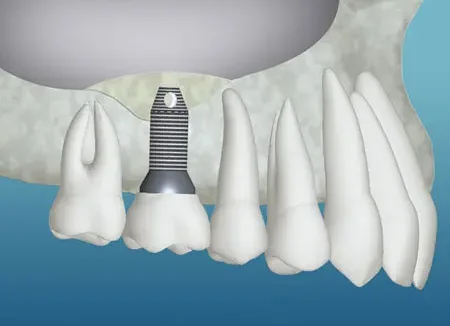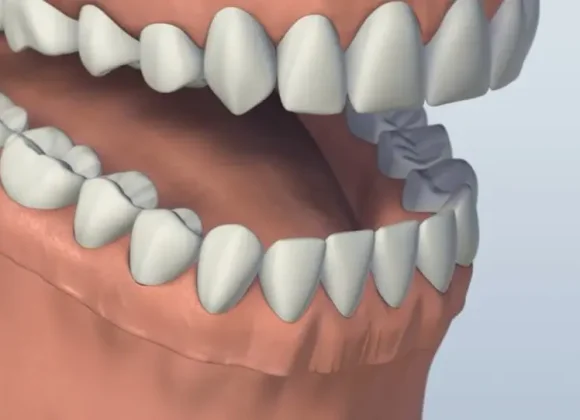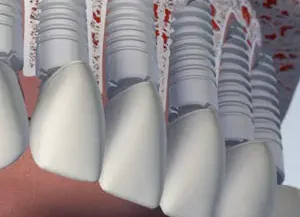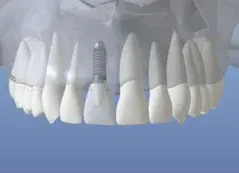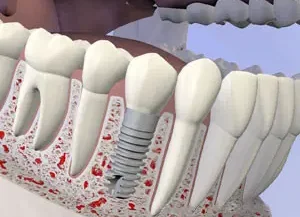Restore Your Smile with Permanent, Natural-Looking Tooth Replacements
If you’re missing one or more teeth, dental implants offer the most durable, natural-looking solution available today. At Third Coast Oral & Maxillofacial Surgery (Third Coast OMS), we specialize in advanced dental implant procedures that restore your oral health, confidence, and quality of life.
What Are Dental Implants?
A dental implant is a small, biocompatible titanium post that replaces the root of a missing tooth. Just like a natural tooth, it anchors a crown (the visible part of your tooth) securely in place. Over time, your jawbone bonds with the titanium implant—a process called osseointegration—creating a strong, permanent foundation for a custom-made replacement tooth.
Whether you're missing one tooth or all of them, dental implants can support crowns, bridges, or full-arch prosthetics, helping you eat, speak, and smile with comfort and confidence.
A Collaborative Approach to Care
Dental implant treatment is a team effort. At Third Coast OMS, our surgeons handle the surgical aspects of care—such as implant placement, extractions, and bone grafting—while your general dentist or prosthodontist creates and fits the final prosthetic. We work closely with your dental provider to ensure every aspect of your care is seamless, personalized, and successful.
Our Dental Implant Process
Comprehensive Evaluation
Your journey begins with a detailed consultation using 3D imaging to assess bone structure and determine the best treatment plan.
Implant Placement Surgery
The dental implant is surgically placed into your jawbone using minimally invasive techniques. In some cases, implants can be placed immediately after tooth extraction.Healing and Integration
Over the next few weeks, your bone naturally fuses with the implant to create a secure foundation.
Abutment & Crown Placement
Once healing is complete, your restorative dentist will place a custom crown, bridge, or denture on top of the implant for a seamless, natural appearance.
Advanced Implant Options
Thanks to cutting-edge surgical techniques, we offer several advanced options to make your implant experience as smooth as possible:
- Immediate Implant Placement – In select cases, the implant can be placed at the same time as a tooth extraction, reducing healing time and the number of procedures.
- Single-Stage Implants – These implants don't require a second procedure to uncover the implant, minimizing downtime.
- Bone Grafting – If bone loss has occurred, grafting procedures can restore your jawbone to support implants.

Dental Implant Placement: Frequently Asked Questions
Many options are available, and they are tailored to your specific requirements. If you need a replacement tooth while the implants are healing, temporary removable teeth or a temporary bridge can be made. If all of your teeth are missing, we can usually modify your present complete denture or make you a new temporary denture. If you would prefer non-removable teeth during the healing phase, temporary transitional implants usually can be placed along with the permanent implants, and temporary teeth may be made and inserted the same day. Depending on your particular situation, some implants can be placed and “loaded” immediately. This means a temporary or permanent replacement tooth can be placed on, or shortly after, the day the implant is placed.
Although it is natural to be concerned about the pain that may be caused by these procedures, most patients do not experience severe or significant post-operative pain. Pain medication and antibiotics will be prescribed for you to make your recovery as easy as possible. Occasionally, some people develop post-operative infections that require additional antibiotic treatment. Even though great care is taken to place the implant precisely, occasionally adjacent teeth are injured in the placement process. In addition, there is a chance that the nerve in the lower jaw, which provides sensation to your lower lip and chin, may be affected. If you are missing quite a lot of bone, it might be difficult to place an implant without infringing on the nerve space. Although we take great care to avoid this nerve, occasionally it is irritated during the procedure, resulting in tingling, numbness or a complete lack of sensation in your lip, chin or tongue. Usually these altered sensations will resolve within time, but they can be permanent and/or painful. If you notify us of post-operative numbness as soon as possible, it will allow us to manage your care in the most appropriate way.
Implants usually last a long time. When patients are missing all of their teeth, long-term studies (more than 30 years) show an 80 to 90 percent success rate. For patients missing one or several teeth, recent studies show a success rate of greater than 95 percent, which compares favorably with other areas in the body that receive implant replacement (such as hips or knees). However, if one of your dental implants either doesn’t heal properly or loosens after a period of time, you may need to have it removed. After the site heals (or on occasion at the time of removal), another implant usually can be placed.
The replacement teeth are usually attached to the implant when adequate healing has occurred and your jaw bone is firmly fused to the implant. Depending on a variety of factors, it may be possible to begin this phase of your treatment immediately or shortly after implant placement. We will review the most appropriate treatment sequence and timing for your particular situation.
The dental work required to complete your treatment is complex. Most of the work involves actually making the new teeth before they are placed. Your appointments are considered more comfortable and more pleasant than previous methods of tooth replacement. Frequently, this process can be performed without local anesthesia.
Your restorative treatment begins with specialized impressions that allow us to produce a replica of your mouth and implants. We will also make “bite” records so that we see the relationship of your upper and lower jaws. With this information, we will make the abutments (support posts) that attach your replacement teeth to your implants. Various types of abutments exist. Frequently, we can use “off the shelf” abutments. Other times, custom abutments must be made of gold or a tooth-colored ceramic material. As you can imagine, these custom made abutments add to the cost and treatment time involved. Which abutment to use is a decision that often cannot be made until after healing is complete and impressions have been made.
The number of appointments and the amount of time required for each appointment is different for each patient. No two cases are exactly the same and regardless of the number of teeth replaced, the work must be completed with great precision and attention to detail. If you are having only a few teeth replaced, as few as three short appointments may be required. Between appointments, we will need time to complete the necessary lab work to make your replacement teeth. It is most beneficial that you keep all of your scheduled appointments.
If your final restoration is a removable denture, you will need to come to as many as five office appointments (although it may be fewer) over the following several months. During these appointments, we will perform a series of impressions, bites and adjustments in order to make your new teeth, as well as the custom support bars, snaps, magnets, or clips that will secure your teeth to the implants. During this period, every effort will be made to ensure you have comfortable, temporary replacement teeth.
In general, once your implants are placed, you can expect your tooth replacement treatment to be completed anywhere from 1 to 12 months. For these reasons, it is difficult for us to tell you exactly how much the restorative phase of your treatment will cost, although you should receive a reasonable estimate from our office. It also is difficult to give you a specific timeframe for completion of your treatment until after the implants are ready for restoration.
As with natural teeth, it is important that you clean implant-supported restorations regularly with toothbrushes, floss and any other recommended aids. You should also visit your dentist several times each year for hygiene and maintenance. As with regular dentures and other tooth replacements, your implants and their associated components are subject to wear and tear and eventually will need repair, including clip replacement, relines, screw tightening, and other adjustments.
Usually, a dental surgeon places the implant(s) and performs other necessary surgical procedures – your general dentist provides the temporary and permanent replacement teeth. Both doctors are involved in planning your dental treatment. Also, depending upon a variety of factors, different dental specialists may help with your dental care.
Before treatment begins, every effort will be made to give you an accurate estimate of all the expenses involved in placing the implants and making your replacement teeth. In many cases, there is an initial charge for the diagnostic work-up, including study models, x-rays, and the fabrication of a surgical template to ensure the best possible result. In addition you will be charged for the abutment or support post(s), plus the crown, dentures, or anything else that will be placed over the implants, including temporary restorations. Periodic maintenance such as hygiene visits, tissue conditioners, denture relines and other repairs will also incur additional charges.
When different doctors are involved in your treatment, you will be charged separately for their services. We will try to assist you in estimating what your actual payments will be after we evaluate your insurance coverage or other third party payments. Also, you should consider your personal financial investment in each treatment option as some insurance companies provide limited or no coverage.
Each patient is unique, and it is not possible for us to discuss every option and every contingency for treatment outcome. This website is intended to help you understand the general treatment options available to you. If your specific treatment options are not clear, please contact us. We will be happy to answer any questions you have about your dental care.
Dental Implant Resources From Our Blog
Anesthesia Information
Comfort‑First Options for Anesthesia
At Third Coast Oral & Maxillofacial Surgery, we tailor anesthesia to each patient's procedure and comfort needs—ranging from simple local numbing and “laughing gas” to IV “twilight” sedation, fully monitored in-office general anesthesia, or hospital-level services in our accredited suite. Every option is overseen by experienced professionals and supported by modern monitoring to ensure your safety and ease throughout treatment.
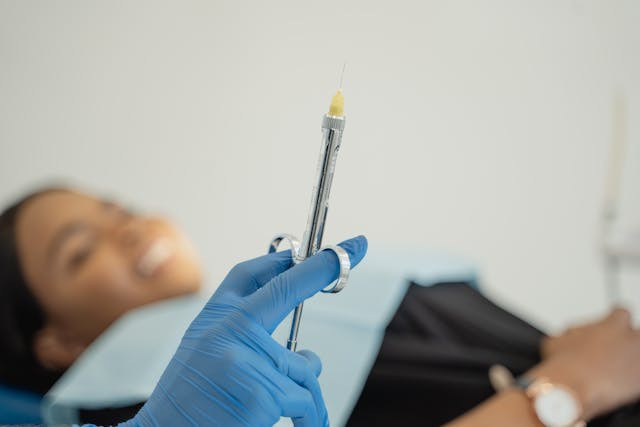
Instant Comfort & Trust
I went in for a consult with Dr. Lytle. He was incredibly kind, understanding, and knowledgeable. He thoroughly answered all of my questions without making me feel rushed or pressured. I felt an instant comfort and trust, which is very important if I’ll be needing surgery in the future. The facility was also beautiful with friendly and very helpful staff. It was a really nice touch how they have a bunch of treats/snacks and drinks as you wait, and when you leave, there are a variety of free gifts for you if you’d like (with “Third Coast” labeling). It was all very thoughtful and appreciated. Thank you!
Trusted Dental Implant Experts in West Michigan
At Third Coast OMS, your care is in the hands of highly trained, board-certified oral and maxillofacial surgeons: Dr. Chip Niquette and Dr. AJ Lytle. With years of specialized surgical training, hospital-based anesthesia experience, and thousands of surgeries performed, we deliver care that’s safe, smooth, and tailored to each of our individual patients.
We welcome patients from throughout Grand Rapids, Holland, Muskegon, Grand Haven, and the surrounding Lakeshore communities.


